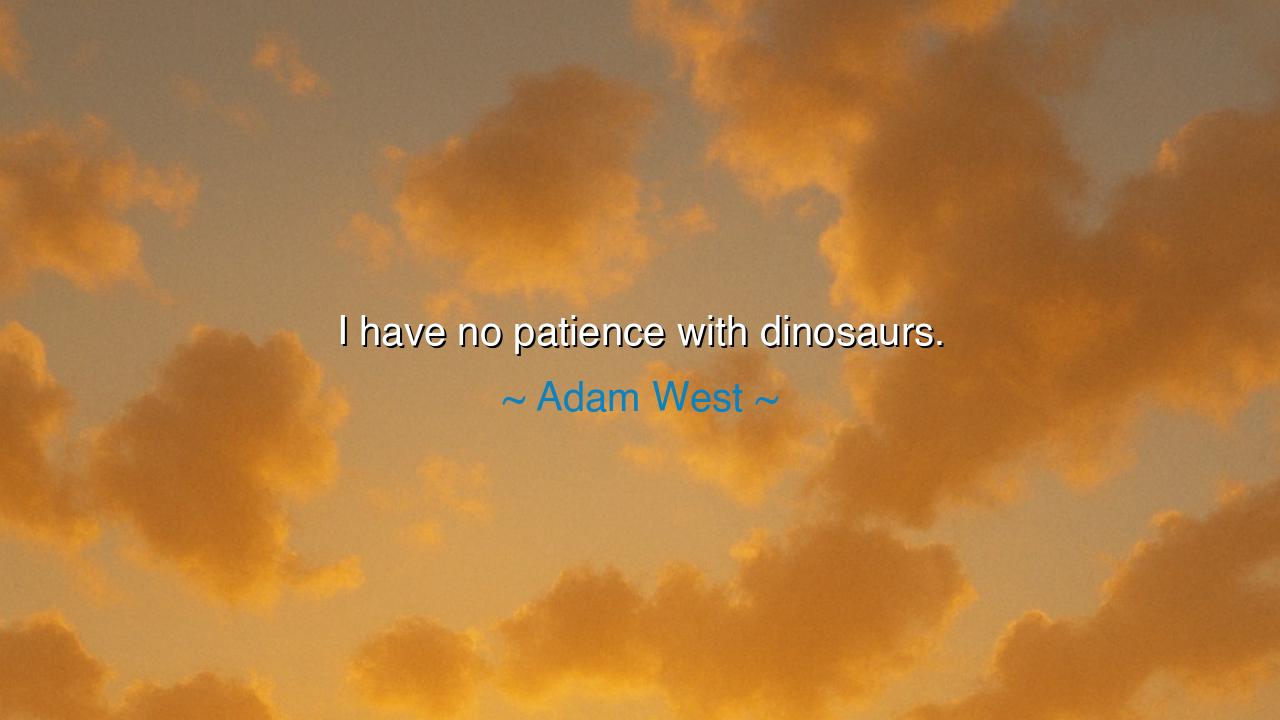
I have no patience with dinosaurs.






The actor and cultural icon Adam West once declared with wit and firmness: “I have no patience with dinosaurs.” Though at first these words may appear playful, wrapped in the humor of a man known for his role as Batman, they strike deeper than jest. For in this brief sentence is contained a teaching about the dangers of clinging to the past, of becoming fossilized in mind and spirit, of refusing to grow while the world moves ever forward. The dinosaurs of which he speaks are not the ancient beasts of bone and stone, but the rigid ideas and outdated ways that refuse to change, lumbering through time until they vanish into dust.
When West proclaims he has “no patience,” he is not scorning tradition nor the wisdom of the ages. Rather, he is rejecting stagnation. For patience with what is unchanging and unwilling to adapt is not virtue—it is a chain. Just as the great reptiles of prehistory once ruled the earth yet fell when the world transformed, so too do institutions, habits, and minds that cling to their old forms meet their downfall. To have no patience with such dinosaurs is to declare allegiance to life, growth, and reinvention.
Consider the story of Kodak, once a titan of photography. For decades, it held the world in its grasp, its film beloved by millions. Yet when the digital age dawned, the company clung to its old ways, unwilling to shed its dinosaur skin. Innovation was within its grasp—it even invented the digital camera—but fear of change chained it to the past. Like the great beasts of old, it collapsed beneath the weight of its own refusal to evolve. Here we see Adam West’s wisdom illustrated: survival belongs to those who change, not those who cling.
In contrast, look to Apple, a company that nearly perished in the 1990s but reinvented itself with boldness. Casting off its old skin, it embraced design, innovation, and new vision, rising from near extinction to lead the world in technology. It was not patience with dinosaurs that saved it, but courage to abandon them, to move swiftly and decisively into the new. Thus, from history we learn that progress belongs not to the lumbering, but to the adaptable.
The lesson is fierce and clear: in our own lives, dinosaurs appear in many forms. They may be habits that no longer serve us, beliefs that stifle growth, or fears that chain us to yesterday. If we cling to them, they will drag us into extinction. To thrive, we must learn Adam West’s bold stance—we must have no patience for what holds us back. We must be willing to shed old skins, break old chains, and move with the living current of time.
This does not mean abandoning wisdom or tradition. It means discerning between what is eternal and what is obsolete. Honor the roots, but cut away the dead branches. Keep the fire of truth, but do not cling to the ashes of what once burned brightly. True growth is not rebellion for its own sake, but the courage to release what has lost its life, so that new life may flourish.
Therefore, my counsel is this: look within yourself and ask—what dinosaurs am I still carrying? Is it bitterness from the past, a rigid habit, or a way of thinking that no longer belongs to the world I now walk in? Cast them aside without hesitation. Be bold. Be alive. The world belongs to those who adapt, to those who move with time rather than resist it.
And so let Adam West’s words echo as a teaching to all generations: “I have no patience with dinosaurs.” May these words remind us that to cling to the dead is to die, but to release and adapt is to live. The future belongs not to the fossil, but to the living. Choose always the path of renewal, and your spirit will never grow old.






AAdministratorAdministrator
Welcome, honored guests. Please leave a comment, we will respond soon